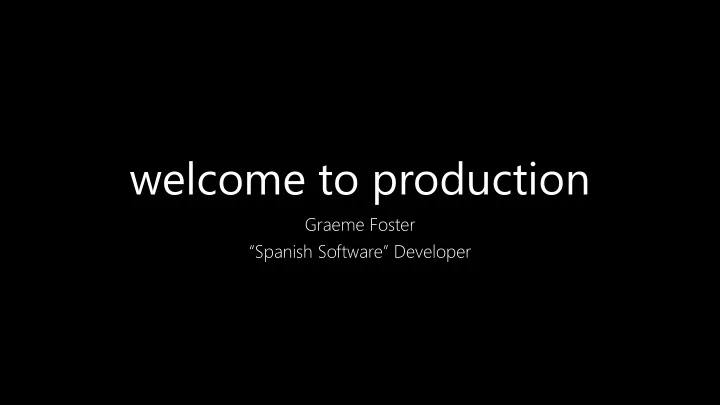

welcome to production Graeme Foster “Spanish Software” Developer
5 years ago, I co-designed, and built a MONOLITH We based in on the buzzwords and ideas of the time like ORMs, DDD, and web services. Like proud parents, we released it into the wild in 2011
System Architecture Azure SQL Fat Client (WPF) IIS IIS Queue Web Services via WCF, aka Death-* load balancer Object Oriented Domain Some DDD concepts but not the important ones Store Warehouse ORM (NHibernate) & a SQL database WPF WPF WPF Warehouse populated via audit-trail
2012 - 2013 2011 - 2012 Move to Azure (Singapore) Single Database Per Store Small number of users Hosted locally
Issues begin to appear Per erfo formanc rmance Sc Scaling ling Co Conc ncur urrenc ency
How will we diagnose issues? • Log Files • Application Profilers • Network Profilers • SQL profiling tools • Intuition
Dear Diary… The following incidents are based on real world incidents that occurred to this system. Name have been altered to protect the innocent!!
Support “users are struggling to complete large sales” Server Log files Fast operation
As seen by Fiddler
The Chatter-Box Api
Caused by looped service calls in code class SaleViewModel { public void OnFinishSale(SaleRequest request) { DoItemPreCheck(request.Items); } private void DoItemPreCheck(Items[] items) { if (items.Any(! stockService.IsAvailableForSale )) { ShowCannotCompleteSaleMessage(....); } } }
Why did it happen? • The ping time from a terminal to Singapore is about 350ms • Calling a service multiple times serially, on the main UI thread, caused the application to lock • Most of the time was due to network latency
Resolution • We “own” the producers and consumers of the API. • It’s simple for us to make the interface much less chatty. • Don’t use chatty api’s over the network
Support “Balancing tills is taking a long time” Network Profiler Single service call from terminal Application Profiler Slow
As seen by the profiler
The family of ‘N+1’s
Caused by looping over sub-collections class TillGroup { public decimal Balance { get { return moneyBags.Sum (t => t.Balance); } } } ... class MoneyBag { … Balance { get { return payments.Sum (t => t.Amount); } } }
Resolution • We hoisted the balance property onto the Till, and pre-calculated. • Getting the balance of a till-group was now a simple read from the database public void AddTransaction(Transaction tran) { transactions.Add(tran); Balance += tran.MoneyBags.Sum(t => t.Amount); } public decimal Balance { get; protected set; }
Support “Till balancing doesn’t always work” Application Profiler Fast
Found in the log file Timestamp Thread Message Balance 2011-07-12-09:32:04.126 (1) retail sale begin 100 2011-07-12-09:32:04.336 (2) retail sale begin 100 2011-07-12-09:32:04.421 (1) retail sale end 130 2011-07-12-09:32:05.073 (2) retail sale end 120
Poor concurrency choice
Caused by our Sql Isolation Level public void AddTransaction(Transaction tran) { transactions.Add(tran); Balance += tran.MoneyBags.Sum(t => t.Amount); } public decimal Balance { get; protected set; } session.BeginTransaction(IsolationLevel. ReadCommitted );
Resolution • We didn’t nail the concurrency model early on • We took the database default of ‘Read Committed’ • Optimistic concurrency models are well supported on ORM’s like Hibernate but moving to one could be a costly exercise for us. • But they have a hidden side effect which disables es sql batching • But luckily, we have single stores per database, and a small number of users… session.BeginTransaction(IsolationLevel. Serializable );
2013 - “Hive” databases (up to 50 stores) Large number of users Hosted in Singapore Database approaching 40GB in size >400 concurrent users
Sometimes it all goes wrong!! Support “Victoria can’t trade. The entire system is down” Application Profiler Lit up like a Christmas tree
Suspicious log file entries Timestamp Thread Message 2011-07-12-09:32:04.126 (1) finish stocktake 2011-07-12-09:32:05.336 (2) update stock 2011-07-12-09:32:05.567 (3) new retail sale 2011-07-12-09:32:06.600 (4) find stock 2011-07-12-09:33:05.336 (2) update stock timeout 2011-07-12-09:33:05.400 (8) finish stocktake 2011-07-12-09:33:05.567 (3) new retail sale timeout 2011-07-12-09:33:06.600 (4) find stock timeout
What does “finish stocktake do”?
Self induced denial of service
What the !#!##!? ake operation greedily edily locked rows causing other operations to block • The Stock T • The ORM was not able to batch tch effectively and took a long time to flush • Multi-tenanting had rendered some of our sql sql index exes es useless • The terminal ti timed ed ou out , and the user kept retr trying ying • The server-side did not ot time out
Potential fix #1 • The hibernate family of ORM have flags to improve batching • Batching enables more sql to be sent to the database per call • Can be a real improvement when late tency ncy to the database is high • But batch operations will still take some ti time me
Potential fix #2 • Move work to background processes to spread the load! • For many use- cases your user’s don’t care if things don’t happen instantly.
Quick resolution Sometimes you need to get the network moving again... if (time is between 8am and 7pm) { throw new DomainException ( "Sorry. Please try again outside of business hours"); }
Conclusions • Avoid chatty distributed components • Keep your indexes tuned • Think about concurrency • Watch that ORM!!! • Fetch strategies, horrid joins, fetching too much, fetching too little!
Thank you for listening Graeme Foster @graefoster gograemefoster@blogspot.com
Recommend
More recommend